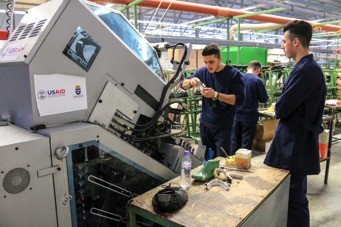
May 2017—Energized and inspired by her three years studying interior design at the Florence Design Institute in Italy, Ariana Canhasi returned to Kosovo—degree in hand—planning to work for her family’s small wood processing company. Not exactly interior design, but close enough, she thought.
But when she heard about a three-month internship available through Kosovo’s Association of Wood Processors that would place her in one of the country’s largest design and furniture companies, Elnor, she jumped at the chance.
“I am passionate about design and this is what I really want to do,” she explains. “I didn’t realize there were companies doing this kind of work already in Kosovo—or that I could have the opportunity to learn from them.”
Canhasi is one of 30 interns who were ultimately offered full-time positions through the association’s internship program, co-financed by USAID’s EMPOWER Private Sector Support project. With most of Kosovo’s higher education programs focusing more on theory than practice, and family connections the overwhelming primary vehicle for employment, many of the country’s educated young people find themselves without the proper connections for the jobs they want or over-educated for the jobs they can get.
Over the past two years, USAID, through EMPOWER, has supported a number of initiatives aimed at connecting the right young person with the right job. To date, more than 620 interns have gained permanent employment through this program, across a variety of growth-ready sectors.
Another key priority for USAID is making sure companies with strong on-the-job training programs—like shoe manufacturer Solid and customer service provider IQ-to-Link—get the support they need to grow and create new jobs. To make up for the lack of quality vocational programs available, many of Kosovo’s businesses have to invest heavily in job-specific training, diverting resources away from other investments needed to expand.
“We’ve developed our training program to ensure that each new hire is given the opportunity to succeed, but it takes more time with some than others,” explains Gresa Kuçi, Solid’s business development manager. “The equipment grant from USAID allowed us to expand into the production of children’s shoes, while not sacrificing the quality of training each employee.”
Through a grant agreement with USAID, Solid hired and trained 60 new employees. The family company, first established in 1996, has doubled in size over the past five years and continues to train 10-20 new employees each month.
For German-owned call center IQ-to-Link, which is new to Kosovo, a USAID equipment grant freed up the startup capital needed to open their first office, with a staff ready to meet the needs of major international clients like Deutsche Post DHL. After training and hiring an initial 200 employees under the 2015 grant agreement, IQ-to-Link has expanded to employ nearly 350 people between their capital office and a second location, which opened a year later.
“Quality customer service is what differentiates us from the competition,” explains IQ-to-Link CEO Jens Reichenbach. “With the support of USAID, we were able to provide industry-standard training to our staff and create new jobs faster than we had originally planned.”
The five-year USAID EMPOWER Private Sector project, which is also funded by the Swedish International Development Cooperation Agency, has been working since July 2014 to stimulate large-scale job creation by elevating the competitiveness of Kosovo firms in the growth-ready sectors of apparel, wood processing, ICT, renewable energy, tourism and metal processing. To date, the project has created 1,700 new jobs across Kosovo with plans to create a total of 5,000 new jobs by July 2019.
LINKS
Follow @USAIDKosovo, on Facebook, on YouTube







Comment
Make a general inquiry or suggest an improvement.